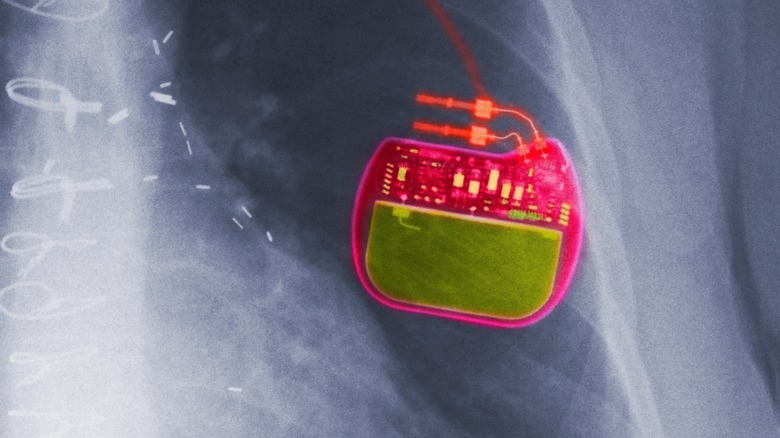Can Stimulating Your Vagus Nerve Help With Weight Loss?
If you search for "vagus nerve" on TikTok or YouTube, you're likely to see videos on how to reset or stimulate this nerve for healing the body. According to Parsley Health, you don't control this nerve; it does its own thing. The vagus nerve is part of your parasympathetic nervous system that restores and heals your body from stress (via Cleveland Clinic). It's not just one nerve but a system of nerves that run from your brain stem, through your neck, chest, heart, and lungs, then into your gut. Problems associated with your vagus nerve include digestive issues, acid reflux, difficulty swallowing, losing your voice, or losing weight.
Because the vagus nerve connects your brain to your stomach, what we eat can throw our vagus nerve into disorder. A 2021 article in Scientific Reports found that both high-fat and high-carb diets disrupt vagus activity, causing people to gain weight. A 2021 study in The Journal of Clinical Investigation reported that sending electrical pulses into your vagus nerve can cause weight loss by reducing your food cravings. The vagus nerve influences the hormones in the gut, which respond to our blood sugar and how much food we eat.
The vagus nerve and eating
According to a 2021 study in the British Journal of Pharmacology, the "rest and digest" parasympathetic nervous system releases glucagon-like peptide 1 (GLP-1) into your gut when you eat. This neuromodulator helps regulate your eating and balances your glucose levels. GLP-1 is lower in people with obesity, and it's also low if you're fasting. Stimulating the vagus nerve can help release GLP-1, which helps you feel satisfied after eating. A 2021 article in Scientific Reports said that high-fat and high-carb diets can disrupt the activity of the vagus nerve. Because vagal tone is essential to feel full after eating, people are likely to gain weight if the vagus nerve is disrupted.
Your vagus nerve can be disrupted if you have chronic stress in your life (via Parsley Health). Stress trips the sympathetic nervous system, which puts your vagus nerve on pause so you can respond to the stressors in your life. This can lead to more bacteria in your gut, leading to digestive issues. Practicing yoga, meditation, and belly breathing can help activate the parasympathetic nervous system, which will get the vagus nerve working again. Cleveland Clinic suggests physical activity and a healthy diet keep the vagus nerve functioning.
Using devices to artificially control the vagus nerve
The vagus nerve can be artificially stimulated with a surgically implanted device that sends electric pulses, according to Mayo Clinic. The Food and Drug Administration has approved these devices to treat epilepsy, depression, and cluster headaches.
According to a 2016 review in The Journal of Physiology, there is potential for using these devices to prevent gaining weight from a high-fat diet. A 2018 study in the BMC Complementary Medicine and Therapies found that stimulating the vagus nerve through the ears in mice changed the nature of their fat tissue. A study is currently underway looking at stimulating the vagus nerve through ear clips in humans to reduce body fat.
However, blocking the vagus nerve signals can also contribute to weight loss. According to MedStar Health, a vBloc (vagal nerve blockade) device can be surgically implanted to block the vagus nerve's hunger messages from the stomach to the brain to help regulate eating. A 2016 study in Obesity Surgery found that this vBloc device contributed to more weight loss than the control condition. Devices like these are alternatives to bariatric surgery.



